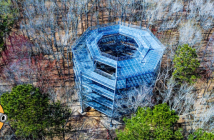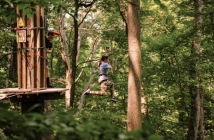ACCT Aiming for In-Person Conference
Like so many organizations, the Association for Challenge Course Technology (ACCT) pivoted to digital for its annual conference in 2021. With restrictions on large group gatherings being lifted, the organization expects the 2022 event to be live and in-person. If all goes according to plan, the ACCT International Conference and Expo will be in Cleveland, Ohio, Feb. 11-13, 2022.
ACCT will utilize its Emergency Operations Plan (EOP) to ensure appropriate safety protocols are in place, and the organization has a contingency plan to go virtual if necessary. Learn more at acctconference.com.
Zipping Onto Your Screen
“Zip Away,” the reality TV show from Steve Gustafson chronicling the installation and inspection work of his Experience Based Learning (EBL) crew, has probably exceeded the expectations of many. EBL has released the first episodes of its fourth season, with several more to come, and begun production on the fifth season.
The show offers an unvarnished look at building, maintaining, and sometimes demolishing aerial attractions, sans most of the artificial drama of typical reality TV, and only occasionally tipping into promotional territory.
Certain technical aspects of the program, including relatable scenarios in the field, speak to the industry insider. The tone and content largely remain accessible to the general public, which points to the show’s most promising opportunity.
It’s not an entirely unheard-of concept, of course. Channels like Discovery, the Travel Channel, and even Red Bull TV produce approachable content that unpacks niche fields. Just look at “Treehouse Masters”—the show about treehouse master builder Peter Nelson and his crew ran for 11 seasons and is still in syndication. Aerial adventure construction, with its scenic locations, unique design and build considerations, and exciting finished products, has similar innate drama. “Zip Away” has moments that capture this essence.
“Zip Away” is available to stream on Roku and Amazon Firestick. Older episodes are on YouTube and Vimeo. Find out more at zipawaytv.com.
Industry Players Respond to Hubbell Advisory
As operators prepared to open this spring, the Hubbell product advisory added an unexpected wrinkle. The aerial adventure industry has used Hubbell deadends, suspension clamps, and pole bands “in applications for which they were not designed,” Hubbell said, which could create a “potential safety issue.” Hubbell warned that “existing usage should be immediately discontinued,” setting off a scramble to devise plans for addressing the advisory. (For more on the advisory, see “Hubbell Warns Against Use of Its Deadends, Clamps, and Bands” at adventureparkinsider.com.)
While there has been a great deal of variation in response—from regulators, inspectors, vendors, and operators—industry players have been nearly unanimous about working to keep aerial adventure operations open. No one wants to force operations to shut down.
Deadend reliability. Most industry members agree that there is no immediate safety issue. Since an incident in Australia in 2008, in which a deadend failed (a backup system prevented a collapse of the line), there have been no published reports of deadend failures.
The general consensus is that the deadends, pole bands, and suspension clamps are service-proven, which makes immediate replacement unnecessary. But the advisory could lead to increased liability, which makes eventual replacement a smart risk-management step. Insurers in the industry noted they have not seen losses related to the Hubbell products, so their use is not a concern. One insurer said it would rather see clients spend money on training than replacing these products, as human error is the biggest liability in aerial operations.
Testing could demonstrate the suitability of the Hubbell deadends in aerial operations. Mike Barker of Adventure MAS, who is also on the safety committee of the Professional Ropes Course Association, said the committee planned to conduct pull tests in late May or early June.
One vendor has already tested its use of the deadends—twice. In 2007, Hubbell pull-tested the vendor’s design for use of the deadends and received certification signed by a Hubbell engineer. The vendor repeated those tests this year with a third-party engineer, and achieved the same result—95 percent of the wire rope’s rated breaking strength, and the engineer’s approval of the product’s use as deployed.
With that information in hand and no evidence of issues, the vendor told API it won’t shut down any of its courses, but will replace the products over two to three years.
Replacement plans. The most typical plan of action from vendors and inspectors is to replace the Hubbell products over a six- to 12-month period, so long as the vendor has supplied the operator with sufficient documentation concerning the engineering of the course. Most regulators appear to be approving this approach. However, some inspectors are insisting on immediate replacement, at least on life-safety lines.
Signature Research is recommending that each operation create a plan to replace the Hubbell products. In an email to clients, Signature said, “The specific timeline should be based upon your operational requirements and in consultation with your legal advisers, insurance providers, and your vendor/manufacturer.
“Given most, but not all applications using these products do have a full strength backup system, we are comfortable making recommendations for replacement that do not require a complete shutdown of your course.”
One inspector who is taking a harder line is Barker. “If it’s a life safety line, the Hubbell deadend has to be replaced immediately. If it’s used on element cables, the operator can change it out over six months,” he said. Among the camps he’s inspected, most operators want to replace the components ASAP. Whenever possible, he offers to replace the products during his visit.
Suspension clamps. Much of the initial attention focused on the use of deadends, but the suspension clamp is in many ways the biggest issue, said one vendor. The clamps are commonly used as part of the redirect system on zipSTOP brakes. “There are alternatives to deadends, but not so many for the suspension clamps,” the vendor said. That’s changing quickly: Kong is already marketing a replacement clamp, and other suppliers told API they have plans to make suitable clamps as well.
Looking to the future. “At end of the day, it’s not about the products, but how we design these courses,” said one vendor. “I pick cable and bolts and telephone poles that aren’t designed for the purpose, but we design and engineer them to work for the designed purpose. We have to ensure it’s done properly.” Added another, “In the future, people will construct courses with products that are designed for use in aerial adventure applications.”
Testing of course design could also become more widespread. “If you build a course or use a product, you really should test it with an independent lab or engineer,” said Barker. “The cowboy days are gone.
We should be more responsible.”






